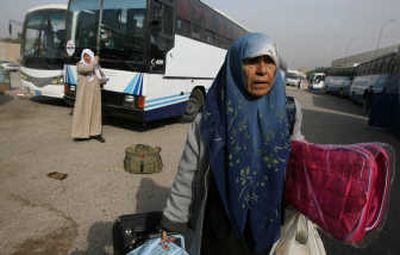State TV promoting happy homecomings

BAGHDAD – A Baghdad family is coming back from self-exile. One child is surprised to see the streets filled with people. The other begs for a trip to an amusement park.
The father removes a padlock and they walk inside the house. “Thanks be to God that we returned to our people and country,” he says.
But the home is a set. The family: actors reading from a government-backed script.
Iraq’s government has launched a state television blitz seeking to claim credit – and score publicity points – for the recent downturn in violence and return of hundreds of refugees to the Iraqi capital.
Such a campaign in itself is not unusual as governments everywhere seek ways to cash in on any good news. But this one rubs some distinct sore points.
Washington has accused Prime Minister Nouri al-Maliki’s administration of failing to use the decline in bloodshed for needed reforms. And U.S. military officials and humanitarian envoys worry the government could actually invite danger by encouraging a flood of refugees that could upset the current security balance.
Al-Maliki’s beleaguered government, however, is hungry for any positive trends. State television, known as Iraqiyah, serves as a countrywide soapbox – which even reaches satellite dishes among the more than 2 million refugees in Syria, Jordan and elsewhere in the region.
“Iraqi television paints a picture of a government that solved all the problems of Iraq because a small number of refugees returned,” said Ibrahim Karim, a 43-year-old civil servant.
The government is unruffled by the criticism. It offers returnees free transport from Syria to Iraq, provides protection to the bus convoys and gives families $600 each to help with resettling.
The focus on refugees returning has not been restricted to commercials, which end with the message: “How sweet it is to return to Iraq.” Shows on state TV, such as the daily “Baghdad by Night,” air interviews with residents expressing gratitude for the improved security in the capital and urging friends and relatives to return home.
“Mohammed, I hope you come back,” said a boy when asked whether he had a message for his best friend, who lives with his family in neighboring Syria. In another interview, a young woman begged her aunts and cousins to return.
Other fixtures include recorded interviews with relieved returnees just off the bus.
“We will never find a country like Iraq anywhere in the world,” a woman said on one of those interviews.
“Being away from home is tough. Iraq needs us,” said another woman.
To further emphasize a drift toward normalcy, the television squeezes in repeated broadcasts of a recent beauty pageant, with contestants in modest street clothes being asked by an interviewer leading questions about security.
But the government could risk uncomfortable comparisons by coming on too strong.
Iraqis remember when state television was the blunt propaganda tool of Saddam Hussein. They also have other options on the screen these days: pan-Arab news channels and private Iraqi stations, including the U.S.-funded Alhurra news station.
“The station focuses on the handful of beautified and lit streets and ignores the destroyed homes and damaged streets,” Iman al-Shweili, a teacher from the mainly Shiite district of Baghdad Jadidah, said of Iraqiyah. “The government is more preoccupied with drowning out the voice of critics than providing a better life for the people.”
Washington’s No. 2 diplomat raised other, more immediate, worries.
U.S. Deputy Secretary of State John Negroponte said there was a danger of a resurgence in violence if Iraq’s government fails to take advantage of the recent security gains.
“It’s one thing to have brought the violence under some semblance of control, but it is another now to follow up with the necessary reconstruction and revitalization projects,” Negroponte told reporters in Baghdad on Sunday.